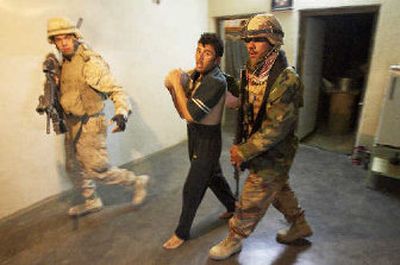Bombings drown out optimism

BAGHDAD, Iraq – Through the smoke of car bombs on the streets of Baghdad, Ali Kathem has trouble seeing the progress that President Bush described Wednesday in a speech in Annapolis.
“At least we didn’t have terrorism under Saddam Hussein. Now, we have explosions, kidnapping, stealing,” said Kathem, 24, a stocky man who has sold cigarettes on a busy roadside in the Iraqi capital for nearly a decade.
In an electronics store nearby, Haider Falleh, 32, said his opinion of the new Iraq crystallized when a half-dozen men in police uniforms, driving police cars, robbed his shop of 45 cell phones. He ran for help to police at a checkpoint across the street. They shrugged.
For Ghassan Abdul Haider, 26, a Shiite police officer in the capital, the religious lines dividing the country have kept him from his home in northern Baghdad for three months. The last time he was there, little children brought notes from his Sunni neighbors saying he would be killed.
Bush, in his speech at the U.S. Naval Academy, spoke of progress toward independence, of land restored to Iraqi control, of gains in stability and democracy, and of the “skill and courage” of newly trained Iraqi security forces.
But on the streets of Baghdad, such optimistic rhetoric contrasts sharply with the thunder of suicide bombs, the scream of ambulance sirens, the roar of racing police cars bearing men with masks and machine guns, and the grim daily reports of assassinations, murders and hostage-taking.
On the same day Bush spoke, nine farmworkers were killed when gunmen opened fire on a bus near Baqouba, snipers fired on the office of a National Assembly member in the capital, and three Iraqi army officers were wounded when a bomb went off near their patrol. In Fallujah, 20,000 people marched in a funeral for a Sunni cleric shot while leaving prayers.
For Iraq, that was a quiet day.
“You just never know what you will face. Each day when I come to work, I think it will be my last day alive,” said Falleh, the electronics store operator. He said he survived one bomb blast and escaped death a second time when police reacting to the bomb fired wildly into his car.
The horror stories of Iraqis are supported by the tabulations gathered from police blotters and daily reports. Statistics are slippery here, but almost every attempt to quantify the violence shows a grim trend.
Multiple-death bombings reached an all-time high of 46 in September, a record likely to be broken this month. More than 400 people have died in bombings this month, compared with 91 a year ago. Every day, according to an estimate by the Brookings Institution in Washington, there are roughly 100 attacks, double the rate of a year ago, and each month between 200 and 300 Iraqi police officers and soldiers are killed. The 93 U.S. troop fatalities in October were higher than in all but three of the last 32 months, according to Brookings.
Iraqis generally agree that things are awful, but there is less unanimity about what should be done. Bush pledged that U.S. troops will stay until the mission is “complete.” Some here approve, but others want them out now.
“They should stay,” said Raed Raek, 20, a government technician. “If they leave, it will be a real mess.”
“I want them to leave today,” countered Muthana Abu Hashim, 32, who was selling eggplants at a sidewalk stand. “They cause too many problems, close the roads, block too much of Baghdad.”
The debate echoes from the clamorous streets of the city, where donkey carts jostle with cars in perpetual gridlock, to the quiet carpeted halls of government in the fortified Green Zone.
At the National Assembly on Wednesday, political leaders diplomatically embraced Bush’s plan for a gradual withdrawal, but then reverted to their own definitions of “gradual.” While Bush emphatically rejected a timetable, Iraqi leaders said they were well aware that public opinion was building in the United States for troop withdrawal within two years.
“You can see the strong blows that have been made against the main center of the insurgency, and the large numbers of terrorists in detention,” said Jawad Maliki, head of the security committee of the parliament, siding with Bush in insisting Iraqi security forces are greatly improved.
But he added, “Of course, an American withdrawal is subject to a request made by the Iraqi government.”
A few minutes later and a few feet away, Adnan Janabi, a former minister of state, scoffed.
“I don’t think anyone thinks security is better,” insisted Janabi. He said the unilateral decisions made by the Americans when they first occupied Iraq, and the frequent replacement of officials in the Iraqi government since then, have left the country teetering and vulnerable.
“We had started straightening up the mess with the police and army that was created by Bremer,” Janabi said, referring to the former U.S. administrator in Iraq, L. Paul Bremer. But the changing of the government set back that progress, he said.
Back in his electronics shop, Falleh predicted that “if the American troops leave right away, there will be massacres between Sunnis and Shiites. If they go, there will be no law left. But they are a target here,” he said. “The U.S. troops make the situation worse.”
He paused, struggling to make a choice.
“I guess what I’m saying is that if they stay, they will cause problems. If they leave, they will cause bigger problems.”